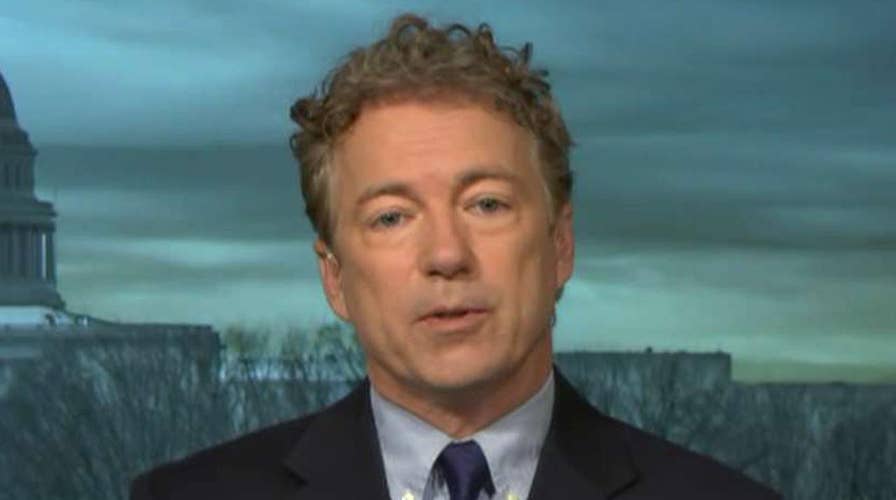Sen. Rand Paul outlines his plan to replace ObamaCare
Kentucky senator explains on 'Sunday Morning Futures'
Sen. Rand Paul on Tuesday reportedly walked out of a meeting with fellow Senate Republicans as House Speaker Paul Ryan worked to reassure skeptical colleagues about the next steps in taking on ObamaCare.
Politico reported that Paul, R-Ky., was unhappy with the meeting and the prospect of keeping the health law’s Medicaid expansion. He called creating tax credits a “new entitlement program.”
“I hear things that are unacceptable to me,” Paul told the website. “If they don’t seem to care what conservatives think about complete repeal of ObamaCare, they’re going to be shocked when they count the votes.”
Attendees reportedly said Ryan laid out a timeline that would start the repeal process by the end of February and pass it by the end of March.
President Trump, according to some in the party, has been fueling the confusion by not being specific about how he plans to take on the 6 ½-year-old ObamaCare. He has said, during his candidacy, that he would “repeal and replace” the law with “something far better.”
VIDEO: DEMOCRATS PLAN TO RALLY SUPPORT BEHIND OBAMACARE
Trump has been edging away from the promise to quickly eliminate the entire law. Still, annulling its taxes would be a partial victory and is irresistible for many GOP lawmakers and the conservative voters at the core of their support.
"We should do full repeal," said Rep. Jim Jordan, R-Ohio, a leading House conservative. "And full repeal means not taking the taxes" from people.
Yet voiding those levies erases a mammoth war chest Republicans would love to have -- and may well need -- as they try replacing Obama's law. It's a major rift GOP leaders face as they try crafting a health care package that can pass Congress.
“Right now, I would say it’s not that easy to repeal it,” Rep. Peter King, R-N.Y., told Politico. “I don’t know where the White House is. The president has said he’s not going to be kicking people off the program, off the rolls. He’s not going to do that.”
If the taxes are repealed and Republicans need money for their replacement plan, do they pay for it with higher federal deficits? Do they deeply cut Medicaid, which provides health care for low-income people, or carve savings from Medicare, which serves the elderly? Might they raise other taxes, something that's been anathema to the GOP for decades?
Paul came up with his own plan, which contains what he calls “conservative reforms.” His plan includes opening up the insurance market and allowing individuals to pool their insurance with others to secure the lowest premium.
“There’s not one item in the plan that we think a Republican would object to,” he told Fox News’ “Sunday Morning Futures.”
"There's going to be a temptation for policymakers to take the easy way out" and simply let deficits rise, said Maya MacGuineas, president of the bipartisan Committee for a Responsible Federal Budget. She said for Republicans promising for decades to improve the nation's fiscal health, that choice "is going to look hypocritical."
The Associated Press contributed to this report.





